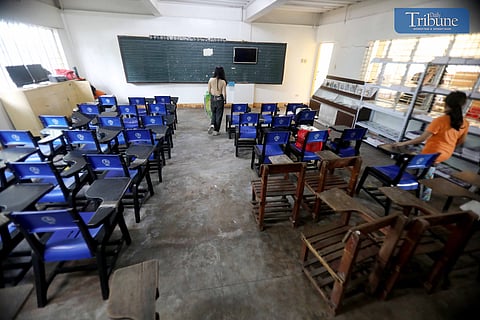
- NEWS
- the EDIT
- COMMENTARY
- BUSINESS
- LIFE
- SHOW
- ACTION
- GLOBAL GOALS
- SNAPS
- DYARYO TIRADA
- MORE

When 24-year-old Angelie (not her real name) decided to shift college courses, she knew it would delay her graduation by at least two years. But what she didn’t expect was the lasting judgment from her family, who saw her decision not as self-preservation, but failure.
“Sometimes I thought they had already accepted that my graduation would be delayed by at least a year. But then out of nowhere, they’d throw it back at me, saying I just wasted time and money,” she said in an interview.
Angelie’s story is far from isolated. The pressures of academic expectations and family obligations continue to weigh heavily on Filipino youth — an issue underscored by the tragic death of University of Santo Tomas student Junver Toledo on 17 May.
Toledo, a senior student in physical therapy, reportedly took his life after failing a subject for the second time by a margin of just 1.5 percent. It was his final year at the College of Rehabilitation Sciences.
His passing has since sparked public outcry, with students and mental health advocates calling for academic reforms and more proactive mental health interventions. While UST extended condolences and described the case as an “unfortunate incident,” many felt the institutional response lacked urgency and empathy.
In an interview with The Varsitarian, former UST vice rector Fr. Virgilio Ojoy, O.P. urged the university to review its academic policies and called for greater compassion. He suggested a more collegial and holistic approach to evaluating student performance, especially in critical or borderline cases. One professor’s decision, he stressed, should not seal a student’s fate.
The issue has gained more attention following a drop in the Philippines’ Mental Health Quotient (MHQ) from 78.44 in 2023 to 68.76 in 2024, based on data from the US-based nonprofit Sapien Labs. This places the country in the “managing” category, with individuals being productive only 70 percent of the time.
Dr. Ed Michael Ruiz, an adult psychiatrist at the National Center for Mental Health, explained that MHQ scores reflect how individuals cope with stress. He pointed to generational gaps, technology, and even diet as contributing factors to deteriorating mental well-being. He also noted that the intangible effects of the COVID-19 pandemic — such as isolation and disrupted routines — continue to affect students today.
A 2021 study by Rowalt Alibudbud of De La Salle University found that 35 percent of college students surveyed in Metro Manila were at risk for depression, while 47 percent were at risk for anxiety. The leading triggers included academic pressure and difficulty coping with schoolwork.
These figures paint a concerning picture — one that continues to unfold. For students like Angelie, the internal battle persists even when grades improve and paths become clearer.
“It’s the usual response from older people, they say they’re just expressing their opinions. They call me too sensitive, and then compare me to their time when, according to them, even being cursed at was something they just accepted,” she said.
